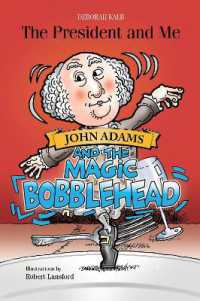- ホーム
- > 洋書
- > 英文書
- > History / World
基本説明
Documents the decline of Lincoln's public standing, asking throughout whether there is any path back from this post-heroic era.
Full Description
By the 1920s, Abraham Lincoln had transcended the lingering controversies of the Civil War to become a secular saint, honored in the North and South alike. Throughout the Great Depression and World War II, Lincoln was invoked as a reminder of America's strength and wisdom, a commanding ideal against which weary citizens could see their own hardships in perspective.But as Barry Schwartz reveals in "Abraham Lincoln in the Post-Heroic Era", those years represent the apogee of Lincoln's prestige. The decades following World War II brought radical changes to American culture, changes that led to the diminishing of all heroes - Lincoln not least among them. As Schwartz explains, growing sympathy for the plight of racial minorities, disenchantment with the American state, and an intensifying celebration of diversity all contributed to a culture in which neither Lincoln nor any single person could be a heroic symbol for all Americans.
Paradoxically, however, the very culture that made Lincoln an object of indifference, questioning, criticism, and even ridicule was a culture of unprecedented beneficence and inclusion, where racial, ethnic, and religious groups treated one another more fairly and justly than ever before. Thus, as the prestige of the Great Emancipator shrank, his legacy of equality continued to flourish.Schwartz documents the decline of Lincoln's public standing, asking throughout whether there is any path back from this post-heroic era. Can a new generation of Americans embrace again their epic past, including great leaders whom they know to be flawed? As the 2009 Lincoln Bicentennial approaches, readers will discover here a stirring reminder that Lincoln, as a man, still has much to say to us - about our past, our present, and our possible futures.








